Thriving Earth Exchange would like to extend a warm welcome to our July 2021 cohort of Community Science Fellows! They’ll be working with communities from Alaska to the Bahamas to launch impactful community science projects. Stay tuned for exciting news from this group!
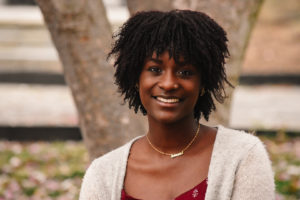
Tatiana Eaves (she/her) is an ecologist by training who currently works at the interface of environmental science and policy. She received a B.S. in biology, with an ecology concentration from Appalachian State University, and a M.S. in environmental science and policy from Johns Hopkins University. Tatiana’s academic research focused on the interactions between and among organisms within their environment, including humans. Her work has since focused on communicating environmental science to various audiences to inspire more inclusive and scientifically informed legislation and policy. Over the course of her career, Tatiana has worked as a science writer and communicator, a researcher, and a policy analyst. Her passions lie in environmental policy, systems ecology, and environmental sociology. With her multidisciplinary background, she aims to protect the rights of people and the environment we reside within by promoting scientific integrity, climate justice, scientific literacy, and illustrating the role and importance of science in our everyday lives. She has given various talks, interviews, and workshops aimed to increase policy engagement and communication skills among scientists and other stakeholders.
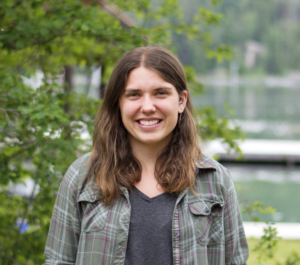
Kate Evans (she/her) is a PhD candidate in the Division of Biological Sciences at the University of Montana/Flathead Lake Biological Station. Her current work focuses on the microbial community and metabolism of Flathead Lake with a particular interest in nutrient inputs. Prior to grad school, she obtained a BS in geobiology from Caltech and spent three summers at the Lowell Observatory in Flagstaff, Arizona studying red supergiant stars. Her time in astronomy left her with a deep interest in coding and modeling, and she spent time with a local Montana high school teaching coding during an after school club. Outside of work, she enjoys hiking, fostering kittens, and baking (sometimes poorly).
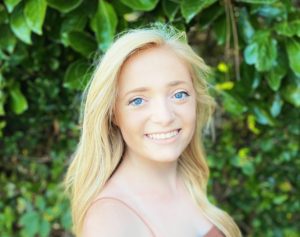
Sophia Huss holds a B.S. in geology and anthropology from the University of Toledo where she focused on near-surface geophysics and archaeology. She is currently a PhD student at Michigan State University where she will be conducting community based participatory research on how to achieve ethical communication and practice between stakeholders involved in extraction industries. She volunteers with Citizens’ Climate Lobby and Boy Scouts of America and has worked in environmental education with the Lake Erie Center and Metroparks Toledo. Her work with public audiences and stakeholders led her to pursue a career centered around community engagement and environmental policy. Sophia has experience working in Tribal spaces and hopes to continue working with Indigenous communities to achieve ethical and effective environmental practices that contribute to climate solutions, equity and inclusion in STEM, and a better quality of life for fenceline communities.
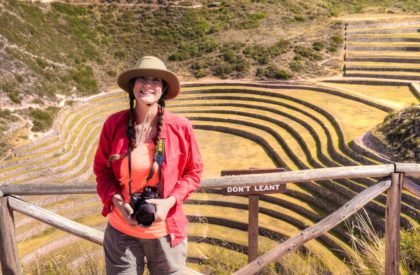
Shelby Johnston is a geochemistry researcher and science-outreach enthusiast. She works with multiple nonprofit programs to bring Earth-science education to underfunded communities. Shelby also serves on the Executive Committee of the International Association for Geoscience Diversity, a nonprofit that improves disability inclusion in geoscience. She holds a Ph.D. in Geology from the University of Houston and a B.S. in Geology from Louisiana State University. In her free time, she can often be found exploring the outdoors.
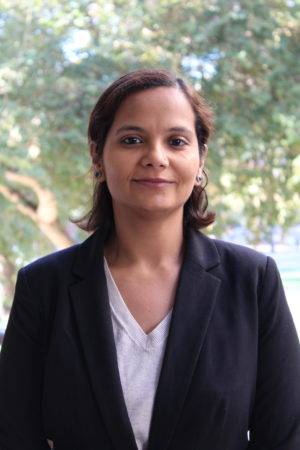
Priyanka Kushwaha is a Postdoctoral Research Associate in the Department of Environmental Science at the University of Arizona, Tucson. She got her PhD in Biochemistry from the Florida International University, FL. Her research focuses on investigating plant-microbe interactions that help facilitate plant survival in metal-contaminated mining soils. Additionally, she is interested in understanding the role of soil microbes in plant adaptation strategies that enable plants to grow in nutrient-limited and metal-contaminated soils. She hopes that the gained knowledge from her research could be applied to improve mine-tailings rehabilitation and restoration of arid lands. She is passionate about science communication and outreach.
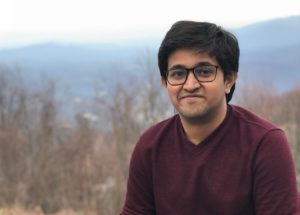
Arka Mitra is a fourth year Atmospheric Science PhD student at the University of Illinois, Urbana-Champaign. His research focuses on the observation and analysis of trends in cloud properties, especially cloud-top heights, from satellites. Although his academic work has primarily focused on improving the current state of observational knowledge in detecting climate change globally, he is also a firm believer in the United Nation’s Sustainable Development Goals and is passionate about working towards ensuring the availability of tools and knowledge of climate resilience, locally, to underprivileged communities, who are also often the worst-affected. Originally hailing from Kolkata (India), Arka received a B.Sc. and M.Sc. in physics from Presidency University, Kolkata and was a graduate project intern at the Indian Institute of Geomagnetism, Mumbai, where his work involved the modeling of ionospheric electrodynamics. He is an avid consumer of books and cinema and he loves to travel.
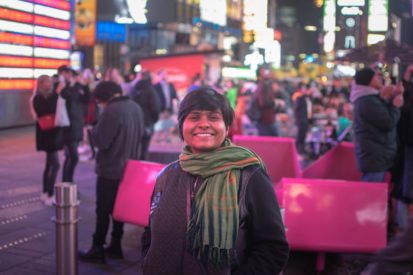
Ishita Pal is an international PhD student at the University of Louisiana at Lafayette. Her research focuses on the formation and evolution of the Solar System, however, she is interested in every aspect of Earth & Planetary Science. For her doctoral thesis with Dr. Manavi Jadhav, Ishita studies the isotopic composition in stardust grains to figure out what kind of stars contributed to the inception of our Solar System. She started her academic journey with a bachelors in geology from the Jadavpur University in Kolkata, India; she has then ventured into the world of geochemistry, geophysics, archaeo-magnetism and experimental petrology for her masters at the Indian Institute of Technology Bombay and the Scripps Institution of Oceanography, UCSD. She loves working in an interdisciplinary field amidst collaborative environment, always learning and applying new things. Ishita is passionate about community education and routinely engages in outreach activities. She has multiple experience in being part of leadership roles, including organizing two international symposiums. Food and dance are her way to connect to the world. She believes the best way to understand a culture is through their food history. Using her choreographies, Ishita likes to tell stories to promote social awareness about nature and diversity.

Kathrin Schilling is an Assistant professor at the School of Public Health at Columbia University. She holds a Ph.D. in Environmental Sciences from J. Gutenberg University Mainz, Germany. She investigates the use of natural stable metal isotope ratios as biomarkers for nutrient status and disease development and progression such as cancer. Her research also focuses on the development of stable metal isotopes as tracers of contaminants and nutrients in the environment.
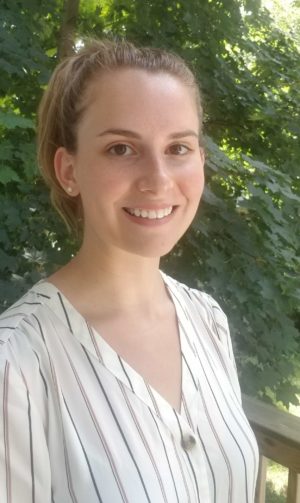
Sara Schulkowski completed her B.S. in Environmental Science and Technology and her M.S. in Environmental Resources Engineering and is excited to find opportunities to contribute to science. She is passionate about volunteer work and helping others. During graduate school, she focussed her learning on water and continues to enjoy reading about ways we can use technology to conserve and improve the quality of water; especially as we continue to anticipate the negative impacts of climate change on our water supplies. In her free time, she enjoys hiking, kayaking, singing, and crocheting. Sara is overjoyed to be joining the Thriving Earth Exchange team and can’t wait to get started!
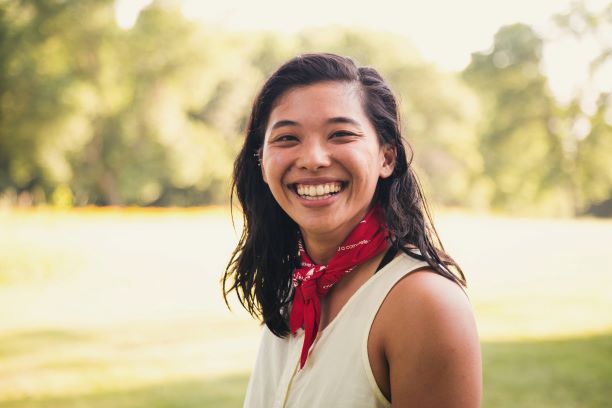
Lienne Sethna is a biogeochemist and PhD Candidate at Indiana University. She works in freshwater ecosystems and her research primarily focuses on the linkages between nutrient availability and harmful algal blooms. Broadly, Lienne is interested in studying how human land use, such as agriculture, influences water quality. She is passionate about engaging with land owners, decision makers, and fellow scientists to answer questions and find solutions to problems related to water resources. When she’s not wading in streams and crunching water quality data, Lienne enjoys biking, visiting local breweries, and cuddling with her dog.
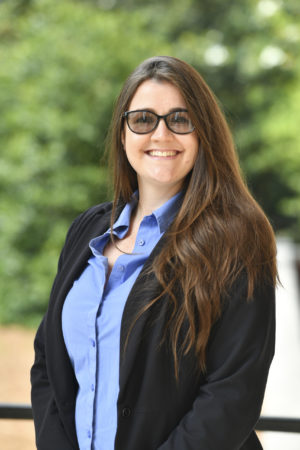
May 27 2021. Headshot of Jessica Sutton. Photos by Matthew McConnell/ Berry College
Jessica Sutton (she/her) is an Assistant Professor of Environmental Science and Studies at Berry College. She teaches an assortment of courses in environmental science including Methods, Case Studies, and Advanced Methods. Jessica also spends time mentoring her undergraduate students through her research. She is currently focused on utilizing remotely sensed precipitation datasets to better understand precipitation during typhoons in the northwestern pacific. She earned her Ph.D. at the University of South Carolina, her master’s at Yale School of Forestry and Environmental Science, and her bachelor’s at Berea College. She is happily married with a five-year old daughter and a 21-month-old son. At home she loves playing with her kids and enjoying their chickens, ducks, bunnies, dogs, and cat.
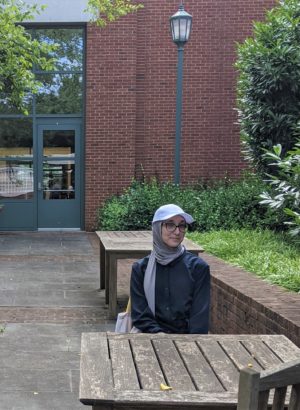
Yusraa Tadj is a Project Analyst with the Hawaii Coastal Zone Management Program, where she works on research and project management related to coastal hazards. Previously, she worked on various environmental and urban planning subject matters, including electric vehicles, affordable housing policy, and transit-oriented development in Hawaii, the water supply system in Mexico, and urban flooding in India. She graduated with honours in Community Design from Dalhousie University, and did her masters in Urban Design at the University of British Columbia. In her free time, catch Yusraa watching a true crime documentary, perfecting her spinning hook kick, or tutoring her brother in physics.





